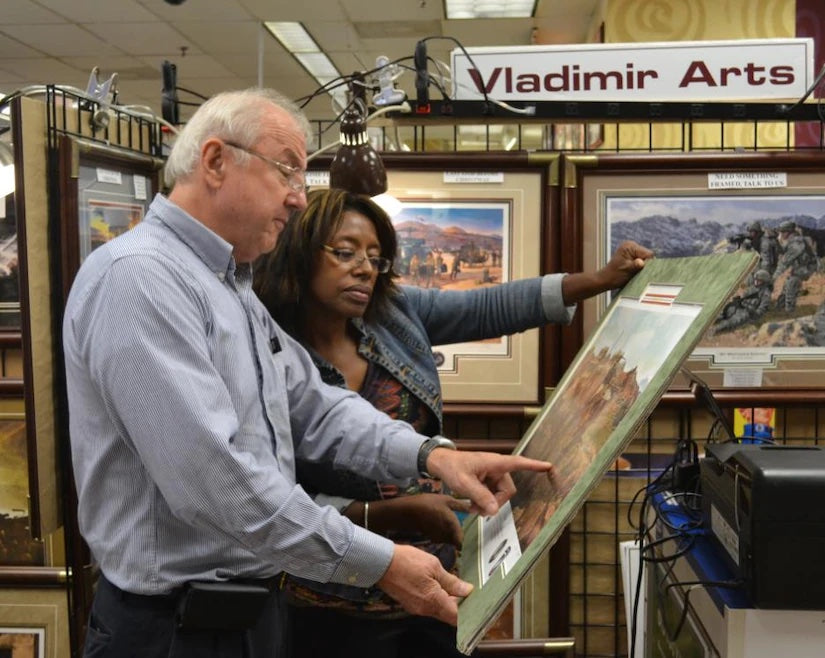JOINT BASE MCGUIRE-DIX-LAKEHURST, N.J. – As you walk through the double-door entrance at your local Exchange, you are greeted by many different types of vendors, some of which routinely travel to different bases around the world. Occasionally you are welcomed by beautiful, patriotic and military-themed paintings. Your eyes connect with images of Afghanistan, Iraq, Korea, Vietnam and more. You'll see colorful depictions of your brothers and sisters in arms, symbolic bald eagles and flashes of red, white and blue.
As you pass by, you take a moment to reflect on the history that is carefully hand-depicted in the prints. Each image represents a story, a snapshot in time; you're so intrigued that you barely notice the man in the background standing near the register, the salesman. Unbeknownst to many, that man has an interesting story of his own; a history that is rich in patriotism and one that embodies the American dream; a story that cannot be told in a painting.
Lew Iwlew, 67, is the owner and founder of Vladimir Arts. His company specializes in military-themed paintings and works closely with units to commemorate significant moments and events in history. The foundation and inspiration for this company began many years ago, and came from a unique culmination of events in Lew's life.
In 1943, in the midst of World War II, many Russians were captured by the Germans when they invaded Russia. They were sent to Germany to join tens of thousands of other captives who comprised a slave-labor force, which was used to supplement the manpower deficit during the war.
One couple, Serifim and Olga Iwlew, were separated and sent to work on different camps in northern Germany. Olga and the couple's 4-year old son, Victor, were sent to a women's camp. After the war ended in 1945, the family was reunited by British soldiers and placed in a refugee camp in Ladhe, Germany. Nine months later, Olga gave birth to their second child, a son, whom they named Vladimir. Today, he goes by the name Lew.
In 1948, when Lew was only 2 years old, his mother Olga passed away in an accident. Serifim later married a woman named Feodosia who had a child of her own, a daughter, Zina. Lew and his family spent the next three years in the displacement camp in Germany. The couple and their three children were sponsored by a church organization and sent to the United States in 1951.
"We were one of the fortunate ones," Lew said.
As they approached their destination, Ellis Island, N.Y., a young Lew and his family anxiously awaited their arrival. While everyone buzzed with excitement about arriving in America, 5-year-old Lew was more impressed with the two oranges he was given.
"I remember they brought everybody from the hull of the ship, as we entered the harbor, everyone was saying, 'America, America!' and someone handed me two oranges," Lew said. "I kept saying 'I have two oranges, I have two oranges!'"
The trip from Germany to America was not free. The church that supported the Iwlew family was from Wooster, Ohio, and Lew's family had to pay back them back for the voyage. "They were good to us, they took care of us," he recalled. Lew's older siblings and his parents worked on a farm for six months and paid their debt in full.
The Iwlew family moved to Kalamazoo, Mich., where they shared a two-bedroom apartment with another family they knew from Russia. Lew, like many young American boys, had aspirations of becoming the world's greatest baseball player; however Uncle Sam had a different plan for him. In 1965, he was drafted by the U.S. Army and shipped off to boot camp.
Six weeks into his training with the Army, officials began making selections for Officer Candidate School. Lew had six credit-hours at the time and was one of two selected out of approximately 110 Soldiers from his basic training company. He didn't know what OCS was, but at the time it seemed like a better option than kitchen police, so he took it. He was sent off to earn his commission at Fort Benning, Ga.
Upon graduating from OCS in 1967, he left for Fort Walters, Texas, to attend flight school. There was a six-month waiting period for his class to begin, but Lew stayed busy--the military had organized baseball teams!
"My first job as a second lieutenant was playing baseball," he chuckled. "I had a blast."
After completing flight school, he was shipped off to Vietnam in 1969. Now a first lieutenant, Lew served as the 4th Battalion Maintenance Officer. He had a strong desire to fly, so he extended his tour in the war-torn country. Getting his wish, he transitioned to Bravo Company, 4th Aviation Battalion, 4th Infantry Division where he flew the AH-1G Cobra helicopter. After 19 months and 19 days at war, Lew finally left Vietnam and headed to Panama.
Lew spent a year-and-a-half in Panama before he returned to Fort Benning, Ga. He made the rank of captain and then attended the Army's ten-month-long Captain's Course. Upon graduation, he was reassigned to the country of his birth, but on much different terms this time. Once a young child in a refugee camp there, he was appointed to command the Headquarters Company, 1st Battalion, 6th Infantry, 1st Armored Division in Illesheim, Germany. After spending a year and half as an infantry officer, Lew wanted to fly again. He got a job as the executive officer with the 175th Attack Helicopter Company, which was a flying position.
"I was very happy to go back to flying, very happy," he said.
While assigned to the 175th, Lew heard about a pretty German girl, named Iris, who was a graduate student at the University of Wurzburg. At the time, Lew was married to his work and had little personal time, but he really wanted to meet her. He was patient and waited nearly a year and half; they were finally introduced through her aunt and began a relationship.
As it turned out, Lew's decision to return to flying would serve him well. One Saturday morning, Lew and his co-pilot were flying a training mission over the village where Iris was staying with her mother. After making a few passes overhead, the chip detector warning light came on. Coincidentally, or maybe not, the safest place to land was her backyard. With the chopper blades still spinning and surrounded by 125 people, he flagged her to come over to the helicopter.
Over the roar of the engine, he yelled, "You have two choices; first one, marry me and the village survives!"
"I forget what the second choice was," he laughed.
And as they say, the rest is history. Lew and Iris have been married for 35 years.
As Lew's active-duty service was coming to an end in 1975, he knew he wanted to sell art. While Iris finished school in Germany, Lew traveled all over Europe meeting with various artists. Paying homage to his given name, Lew and Iris created Vladimir Arts in Ansbach, Germany, in 1975.
"I saw another vendor selling artwork to the military, it was terrible," said Lew. "I've always been a photographer and involved with those types of creative things, so I knew it was something I could do."
Today, you can find prints from Vladimir Arts in various Army and Air Force Exchanges.
"Our company has really grown," said Lew. "We proudly serve nearly 250 thousand military customers."
Marine Maj. Andrew Aranda, who was temporarily assigned to the Defense Information School at Fort George G. Meade, Md., recently purchased a set of three paintings known as "American Freedom," by artist Rick Kelley. The collection features a mountain range with soaring bald eagles and hints of American icons hidden in the painting. If you look carefully, you will find Lady Liberty painted within the texture of the mountains and you can also see a reflection of the American flag in the river below.
"Immediately, I connected with Lew when he mentioned he had been a cobra pilot, like me," said Aranda. "I was happy to do business with him. And the quality of the art work speaks for itself; my wife is going to love them."
So the next time service members and their families are passing through the foyer of their local Exchanges, they should take a moment to observe their surroundings. Strike up a conversation with an AAFES vendor, they just might stumble upon an incredible story and learn something.

